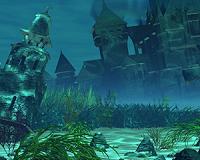| . |  |
. |
Pasadena CA (JPL) Mar 16, 2011 The March 11, magnitude 9.0 earthquake in Japan may have shortened the length of each Earth day and shifted its axis. But don't worry-you won't notice the difference. Using a United States Geological Survey estimate for how the fault responsible for the earthquake slipped, research scientist Richard Gross of NASA's Jet Propulsion Laboratory, Pasadena, Calif., applied a complex model to perform a preliminary theoretical calculation of how the Japan earthquake-the fifth largest since 1900-affected Earth's rotation. His calculations indicate that by changing the distribution of Earth's mass, the Japanese earthquake should have caused Earth to rotate a bit faster, shortening the length of the day by about 1.8 microseconds (a microsecond is one millionth of a second). The calculations also show the Japan quake should have shifted the position of Earth's figure axis (the axis about which Earth's mass is balanced) by about 17 centimeters (6.5 inches), towards 133 degrees east longitude. Earth's figure axis should not be confused with its north-south axis; they are offset by about 10 meters (about 33 feet). This shift in Earth's figure axis will cause Earth to wobble a bit differently as it rotates, but it will not cause a shift of Earth's axis in space-only external forces such as the gravitational attraction of the sun, moon and planets can do that. Both calculations will likely change as data on the quake are further refined. In comparison, following last year's magnitude 8.8 earthquake in Chile, Gross estimated the Chile quake should have shortened the length of day by about 1.26 microseconds and shifted Earth's figure axis by about 8 centimeters (3 inches). A similar calculation performed after the 2004 magnitude 9.1 Sumatran earthquake revealed it should have shortened the length of day by 6.8 microseconds and shifted Earth's figure axis by about 7 centimeters, or 2.76 inches. How an individual earthquake affects Earth's rotation depends on its size (magnitude), location and the details of how the fault slipped. Gross said that, in theory, anything that redistributes Earth's mass will change Earth's rotation. "Earth's rotation changes all the time as a result of not only earthquakes, but also the much larger effects of changes in atmospheric winds and oceanic currents," he said. "Over the course of a year, the length of the day increases and decreases by about a millisecond, or about 550 times larger than the change caused by the Japanese earthquake. The position of Earth's figure axis also changes all the time, by about 1 meter (3.3 feet) over the course of a year, or about six times more than the change that should have been caused by the Japan quake." Gross said that while we can measure the effects of the atmosphere and ocean on Earth's rotation, the effects of earthquakes, at least up until now, have been too small to measure. The computed change in the length of day caused by earthquakes is much smaller than the accuracy with which scientists can currently measure changes in the length of the day. However, since the position of the figure axis can be measured to an accuracy of about 5 centimeters (2 inches), the estimated 17-centimeter shift in the figure axis from the Japan quake may actually be large enough to observe if scientists can adequately remove the larger effects of the atmosphere and ocean from the Earth rotation measurements. He and other scientists will be investigating this as more data become available. Gross said the changes in Earth's rotation and figure axis caused by earthquakes should not have any impacts on our daily lives. "These changes in Earth's rotation are perfectly natural and happen all the time," he said. "People shouldn't worry about them."
Share This Article With Planet Earth
Related Links - Tectonic Science and News
 U.S. researcher makes Atlantis claim
U.S. researcher makes Atlantis claimHartford, Conn. (UPI) Mar 15, 2011 The latest claim of "finding" the legendary lost island of Atlantis comes from a U.S. researcher who pinpoints it in a vast marsh in southern Spain. University of Hartford archaeologist Richard Freund said electro-imaging systems designed for gas and oil exploration have identified shapes first described by Plato about 360 B.C., and that artifacts and other evidence point to the lost is ... read more |
|
| The content herein, unless otherwise known to be public domain, are Copyright 1995-2010 - SpaceDaily. AFP and UPI Wire Stories are copyright Agence France-Presse and United Press International. ESA Portal Reports are copyright European Space Agency. All NASA sourced material is public domain. Additional copyrights may apply in whole or part to other bona fide parties. Advertising does not imply endorsement,agreement or approval of any opinions, statements or information provided by SpaceDaily on any Web page published or hosted by SpaceDaily. Privacy Statement |